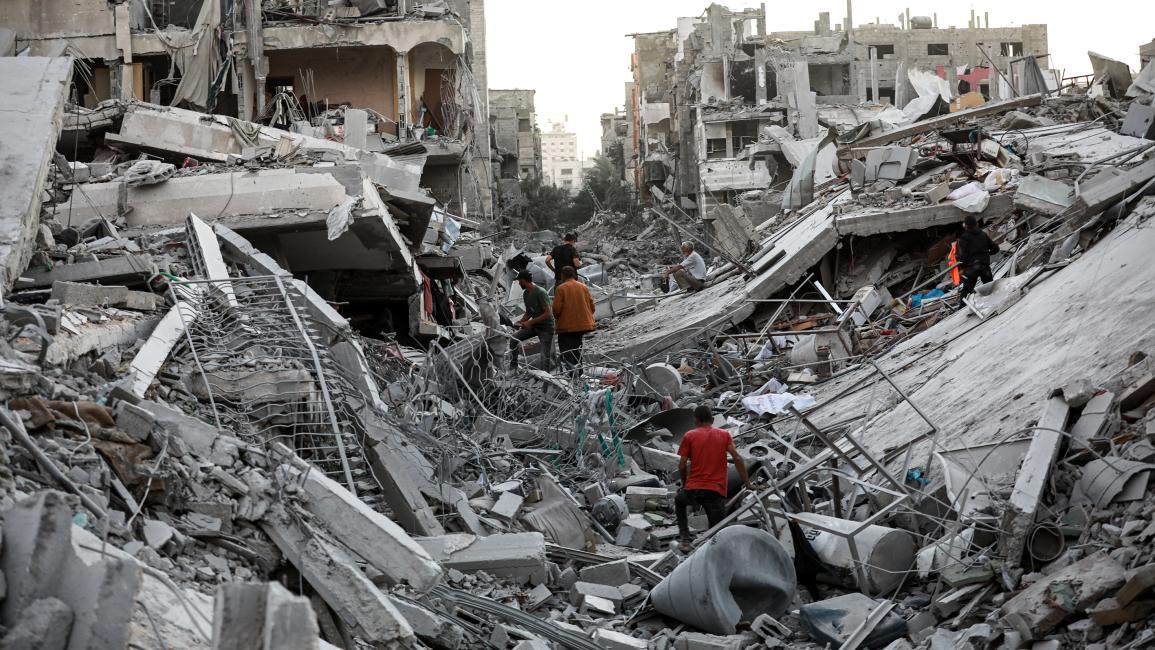Alwaght- A week after announcement of ceasefire in Gaza Strip and Trump’s propagandaistic show in Egypt's Sharm El-Sheikh about bringing the so-called peace to the region, the clouds of rejuvenated war gather over Gaza as the Israeli regime after release of its prisoners by Hamas continuously creating excuses to restore war.
Decades of experience show that truce agreements have never stopped the Israeli war machine. The government of Prime Minister Benjamin Netanyahu is now using the issue of deceased Israeli soldiers' remains as a new tool, to create a pretext for resuming attacks on Gaza. After being a low priority for Tel Aviv for two years, the bodies have now gained clear political and security value, instrumentalized to advance political goals.
Some sources report that Israel has warned the US it will halt the Gaza ceasefire process if Hamas does not return the soldiers' remains. According to Axios, which cited two Israeli and one US official, Netanyahu told Trump that Hamas is not trying hard enough to recover the bodies and that the truce cannot move to its next phase until the situation changes.
Hamas has fired back, accusing Netanyahu of sabotaging the agreement. The group stated that recovering the bodies is a time-taking process, with some remains buried under collapsed tunnels and others beneath the rubble of buildings destroyed by Israeli bombs.
After returning several bodies, Hamas announced it currently has no others to hand over and that further recovery requires specialized efforts and equipment. It places full responsibility for any delays squarely on Netanyahu's cabinet, which it says is blocking the entry of necessary equipment. Hamas asserts that "Netanyahu is not honoring his commitments and is instead placing obstacles in the path of the Hamas's efforts to recover the remaining bodies."
This situation suggests that Tel Aviv's public urgency about the bodies is primarily a political and propaganda tool, serving as an excuse to justify further military action. These threats from Israel could seriously jeopardize the next phase of negotiations and destabilize Gaza.
Over the past ten days, Israeli forces have repeatedly violated the ceasefire, resulting in dozens of Palestinian casualties. These frequent violations reveal the regime's true approach to truces, demonstrating that it will not abide by any agreement that hinders its ability to apply pressure and pursue its military objectives.
Netanyahu struggling to save collapsing cabinet
Tel Aviv seeks set of aims behind putting the skids under the ceasefire. Netanyahu and his cabinet, under the ruse of bodies not delivered to them, are procrastinating and ceasefire implementation and use this as an instrument to advance their military and political aims.
Accusing Hamas allows Netanyahu to manage domestic dissent and pressure, and to maintain the fragile foundations of his right-wing coalition. Hardline cabinet ministers such as Itamar Ben-Gvir and Bezalel Smotrich have previously stated they would leave the coalition if a comprehensive agreement with Hamas is accepted – a scenario that places intense political pressure on Netanyahu and drives him to seek additional leverage.
Pressing Hamas for concessions
By highlighting the issue of bodies of prisoners, Netanyahu is also leveraging it to secure greater concessions in subsequent negotiations. The restriction of humanitarian aid and equipment into Gaza, which is aimed at pressuring Hamas for security and political gains, demonstrates that this move is less a humanitarian concern and more a strategic tool to strengthen the Israeli regime's position at the negotiating table and justify future military actions.
Although Hamas has agreed to the broad outlines of the ceasefire, key issues such as the disarmament of resistance groups and the political governance of post-war Gaza remain points of contention.
Tel Aviv’s delays in implementing the ceasefire are also intended to weaken Hamas and pressure resistance factions. The primary goal of the ground invasion of Gaza was to destroy Hamas, but more than two years later, it is clear this plan has failed. Al-Qassam Brigades remain active in the streets of Gaza, and from the perspective of Israeli analysts, the continued presence of Hamas fighters throughout the strip demonstrates that the war has been fruitless, marking a clear failure for Netanyahu’s hardline cabinet.
For this reason, Netanyahu believes that by maintaining the shadow of war over Gaza, he can put strains on Hamas for accepting disarmament, thereby saving face in the eyes of his critics.
If war resumes, the consequences will be far-reaching for the occupied territories and the entire region. A return to violence will not alleviate domestic pressure on Netanyahu; on the contrary, it could intensify criticism against his cabinet, as the two-year war of attrition and its heavy economic, reputational, and military costs have exhausted the public in the occupied territories.
On the other hand, having in mind that Sharm El-Sheikh agreement was signed with a broad international support, any further warmongering of the Israelis will unleash against the Israeli regime a new wave of foreign pressures. Also, fresh conflict can impact the Israeli relations with the Arab countries and mar Trump's efforts to advance normalization process, officially called Ibrahim Accords.
In general, the Israeli obstruction of the ceasefire under the excuse of the Hamas not handing over bodies of prisoners goes beyond a technical and human difference and is giving Netanyahu a strategic instrument to maintain political power, military lever, and pressure during the negotiations. As long as Tel Aviv does not develop a true will for acting on its obligations, the ceasefire hold will be shrouded in mystery.



























